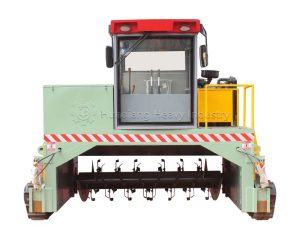Common Problems and Precautions of Organic Fertilizer
Generally speaking, the problems encountered during the processing, transportation, and storage of fertilizers are mainly related to caking. Other issues include fermentation problems and nutrient imbalance.
Firstly, the materials we usually produce include ammonium salts, phosphate salts, trace element salts, and potassium salts, etc. Most of these substances contain crystalline water and are prone to moisture absorption and caking. For instance, ammonium sulfate is prone to caking, and phosphate salts and trace element salts tend to caking when they come into contact, turning into substances that are not easily soluble in water. Urea, when mixed with trace element salts, is likely to release water and caking, mainly because urea replaces the crystalline water in the trace element salts, turning into a paste and then caking.
Secondly, the production of organic fertilizer by equipment is generally non-enclosed. During the production process, the higher the air humidity, the more likely the fertilizer is to absorb moisture and caking. In dry weather or with dry raw materials, the fertilizer is less likely to caking.
Thirdly, the higher the room temperature in the double roller press granulator, the better the dissolution. Generally, when raw materials dissolve in their own crystalline water, caking is more likely to occur. The higher the temperature of nitrogen, the less likely it is to caking after water evaporation. This temperature is usually above 50℃, and to reach this temperature, we usually need to heat it.
Inadequate fermentation: Uncompletely decomposed organic fertilizer may contain harmful substances such as pathogens, insect eggs, and weed seeds, which can have adverse effects on crops when directly applied. Moreover, uncompletely decomposed organic fertilizer generates heat during decomposition, causing root and seedling burn.
Insufficient or unbalanced nutrients: Although organic fertilizer contains various nutrients, its nutrient content is relatively low, and the nutrient ratios of different types of organic fertilizer vary greatly. Therefore, relying solely on organic fertilizer may not meet the high-yield and high-quality requirements of crops, and it needs to be used in combination with other fertilizers such as chemical fertilizers.
To avoid the above problems during the production of fertilizers, it is necessary to pay attention to the drying of fertilizers, and use fertilizer dryer and fertilizer cooler reasonably; it is also necessary to use equipment such as fertilizer compost turning machines for thorough fermentation and add nutrients during fertilizer mixing.
